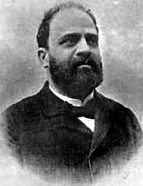

Some might consider Adolfo Coelho to have been less a historian and more an agent for change, as well something of a historical character. He was, after all, with his radicalism of anti-regime positions, directly responsible for the closure of the Lisbon Casino Conferences in 1871 and for the fame given to them as a turning point in the crisis of changing mindsets and forces in nineteenth-century Portugal, a fame that the conferences probably would not have acquired had they proceeded freely and according to schedule. In his other work promoting educational growth in Portugal and introducing new scientific perspectives in the study of language, Adolfo Coelho always laid his eyes firmly on the future he helped create, rather than the past which fuelled history. Given these caveats, how could we not acknowledge that, in his day and age, the ways of thinking and inquiring, the tools, references and programs were so deeply diachronic that it made of each person who ventured into producing science a historian malgré lui?
Francisco Adolfo Coelho was born in Coimbra on 15 January 1847 and died in Carcavelos on 9 February 1919. He lost his father very early and had a difficult childhood. When he was 15 years old he enrolled at the University of Coimbra to study mathematics, but abandoned regular studies midway through (1862-64), displeased with the education provided. Shortly after (1865), he attended the Curso Superior de Letras in Lisbon for at least one year, which also did not satisfy him. His criticism of the course, accusing it of imitating French faculties, when these were leaving that model behind, did not, however, prevent him from later applying for a professor's position there. With his sights set on German culture, he began his studies of philology, which at that time was, in the words of Leite de Vasconcelos, "a German science". He must have embarked on self-study, as we do not know of any Portuguese, or foreign, tutor. It was not long, however, before he received international recognition with the publication, at the age of 21, of his pioneering work – A lingua portugueza: phonologia, etymologia, morphologia e syntaxe (The Portuguese Language: Phonology, Etymology, Morphology and Syntax, 1868) – a short book, usually considered, following Leite, as the starting point for linguistic science in Portugal.
